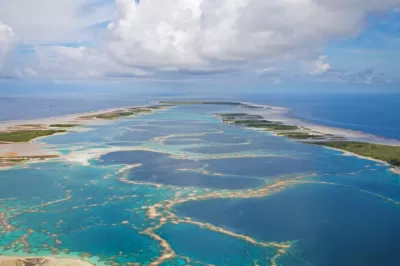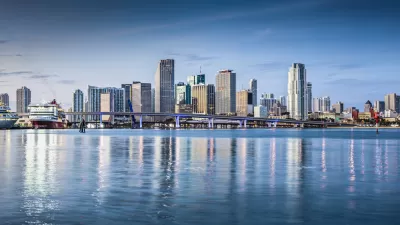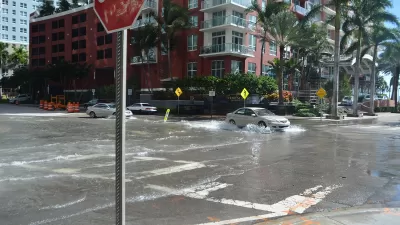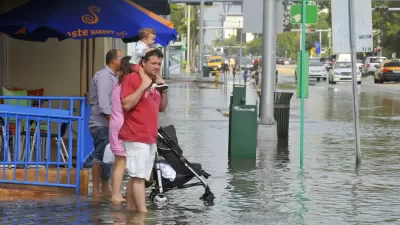As the climate warms, the world's glaciers and ice sheets are melting, but sea level increase will be greater in some places due to the earth's rotation and gravity, according to a newly released study by the NASA Jet Propulsion Laboratory.

How much can you expect rising sea levels to threaten your coastal city? The answer lies in part in knowing which glacial ice melts affect it, so planners can determine how much of an increase to prepare for.
"NASA's Jet Propulsion Lab has mapped how changes in these giant ice fields influence sea levels both nearby and thousands of miles away," reports Christopher Joyce, science correspondent for NPR (audio available). "They published their results in the journal Science Advances."
It turns out that in New York City, the sea level would be affected more by melting ice on the northern end of Greenland than much closer ice in southern Greenland, or even ice in Canada.
Scientists are now using this information to predict the future for American cities, but they're also building in a lot of local geographical information.
"The National Oceanic and Atmospheric Administration (NOAA) is putting together a sea level rise grid for the country, one that will factor in local conditions as well as the effects of faraway melting ice," adds Joyce.
Sea level decrease?
Yes, melts in the eastern Greenland ice sheet could cause a minor drop in sea level in Norway while raising sea levels off Tokyo by several inches, writes Joyce.
============================================================================================================================
Jeff Goodell’s new book, The Water Will Come: Rising Seas, Sinking Cities, and the Remaking of the Civilized World was reviewed by Jennifer Senior for The New York Times on Nov. 22. While Joyce of NPR indicates that sea level has risen an average of eight inches over the last century, Senior writes that the authors of climate reports for the 2015 Paris agreement estimate sea level rise at over three feet by 2100.
Now many scientists believe that estimate is too low. Some say the sea could rise as much as six feet; others say even more than that.
“For anyone living in Miami Beach or South Brooklyn or Boston’s Back Bay or any other low-lying coastal neighborhood,” Goodell writes, “the difference between three feet of sea level rise by 2100 and six feet is the difference between a wet but livable city and a submerged city.”
"Of all the American cities in this book, Miami seems least equipped to handle a rise in sea level, founded as it is on pleasure, real estate and the inalienable right to not pay state income taxes," adds Senior.
FULL STORY: The Sea Level Threat To Cities Depends On Where The Ice Melts — Not Just How Fast

Maui's Vacation Rental Debate Turns Ugly
Verbal attacks, misinformation campaigns and fistfights plague a high-stakes debate to convert thousands of vacation rentals into long-term housing.

Planetizen Federal Action Tracker
A weekly monitor of how Trump’s orders and actions are impacting planners and planning in America.

In Urban Planning, AI Prompting Could be the New Design Thinking
Creativity has long been key to great urban design. What if we see AI as our new creative partner?

How Trump's HUD Budget Proposal Would Harm Homelessness Response
Experts say the change to the HUD budget would make it more difficult to identify people who are homeless and connect them with services, and to prevent homelessness.

The Vast Potential of the Right-of-Way
One writer argues that the space between two building faces is the most important element of the built environment.

Florida Seniors Face Rising Homelessness Risk
High housing costs are pushing more seniors, many of them on a fixed income, into homelessness.
Urban Design for Planners 1: Software Tools
This six-course series explores essential urban design concepts using open source software and equips planners with the tools they need to participate fully in the urban design process.
Planning for Universal Design
Learn the tools for implementing Universal Design in planning regulations.
Gallatin County Department of Planning & Community Development
Heyer Gruel & Associates PA
JM Goldson LLC
City of Camden Redevelopment Agency
City of Astoria
Transportation Research & Education Center (TREC) at Portland State University
Jefferson Parish Government
Camden Redevelopment Agency
City of Claremont





























